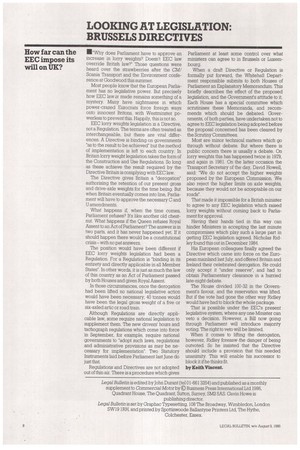How far can the EEC impose its will on UK?
Page 54

If you've noticed an error in this article please click here to report it so we can fix it.
111"Why does Parliament have to approve an increase in lorry weights? Doesn't EEC law override British law?" Those questions were heard over the strawberries after the CM/ Scania Transport and the Environment conference at Goodwood this summer.
Most people know that the European Parliament has no legislative power. But precisely how EEC law is made remains something of a mystery. Many have nightmares in which power-crazed Eurocrats force foreign ways onto innocent Britons, with Westminster powerless to prevent this. Happily, this is not so.
EEC lorry weights legislation is a Directive, not a Regulation The terms are often treated as interchangeable, but there are vital differences. A Directive is binding on governments "as to the result to be achieved" but the method of implementation is left to each country. In Britain lorry weight legislation takes the form of the Construction and Use Regulations. So long as these achieve the result required by the Directive Britain is complying with EEC law.
The Directive gives Britain a "derogation" authorising the retention of our present gross and drive-axle weights for the time being. But when Britain eventually comes into line, Parliament will have to approve the necessary C and U amendments.
What happens if, when the time comes, Parliament refuses? It's like another old chestnut. What happens if the Queen refuses Royal Assent to an Act of Parliament? The answer is in two parts, and it has never happened yet. If it should happen there would be a constitutional crisis with no pat answers.
The position would have been different if EEC lorry weights legislation had been a Regulation. For a Regulation is "binding in its entirety and directly applicable in all Member States". In other words, it is just as much the law of this country as an Act of Parliament passed by both Houses and given Royal Assent.
In those circumstances, once the derogation had been lifted no national legislative action would have been necessary; 40 tonnes would have been the legal gross weight of a five or six-axled artic or road train.
Although Regulations are directly applicable law, some require national legislation to supplement them. The new drivers' hours and tachograph regulations which come into force in September, for example, require national governments to "adopt such laws, regulations and administrative provisions as may be necessary for implementation". Two Statutory Instruments laid before Parliament last June do just that.
Regulations and Directives are not adopted out of thin air. There is a procedure which gives Parliament at least some control over what ministers can agree to in Brussels or Luxembourg.
When a draft Directive or Regulation is formally put forward, the Whitehall Department responsible submits to both Houses of Parliament an Explanatory Memorandum. This briefly describes the effect of the proposed legislation, and the Governments attitude to it Each House has a special committee which scrutinises these Memoranda, and recommends which should be debated. Governments, of both parties, have undertaken not to agree to EEC legislation being adopted before the proposal concerned has been cleared by the Scrutiny Committees.
Most are minor technical matters which go through without debate. But where there is public concern there is usually a debate. On lorry weights this has happened twice in 1979, and again in 1981. On the latter occasion the Transport Secretary of the day, David Howell, said: "We do not accept the higher weights proposed by the European Commission. We also reject the higher limits on axle weights, because they would not be acceptable on our roads".
That made it impossible for a British minister to agree to any EEC legislation which raised lorry weights without coming back to Parliament for approval.
Having their hands tied in this way can hinder Ministers in accepting the last minute compromises which play such a large part in getting EEC legislation agreed Nicholas Ridley found this out in December 1984.
His European colleagues finally agreed the Directive which came into force on the European mainland last July, and offered Britain and Ireland their celebrated derogation. He could only accept it "under reserve", and had to obtain Parliamentary clearance in a hurried late-night debate.
The House divided 100-32 in the Government's favour, and the reservation was lifted. But if the vote had gone the other way Ridley would have had to block the whole package.
That is possible under the EEC's present legislative system, where any one Minister can veto a decision. However, a Bill now going through Parliament will introduce majority voting. The right to veto will be limited.
When it comes to lifting the derogation, however, Ridley foresaw the danger of being outvoted. So he insisted that the Directive should include a provision that this needed unanimity. This will enable his successor to block it if he thinks fit.
by Keith Vincent.




































































































